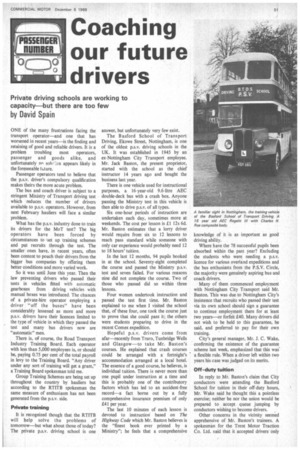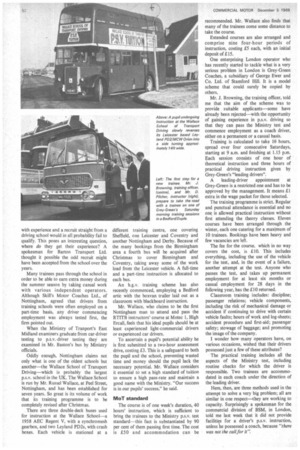Coaching our future drivers
Page 53

Page 54

If you've noticed an error in this article please click here to report it so we can fix it.
Private driving schools are working to capacity—but there are too few
by David Spain
ONE of the many frustrations facing the transport operator—and one that has worsened in recent years—is the finding and retaining of good and reliable drivers. It is a problem troubling most operators, passenger and goods alike, and unfortunately no soll..:,on appears likely in the foreseeable I Lture.
Passenger operators tend to believe that the p.s.v. driver's compulsory qualification makes theirs the more acute problem.
The bus and coach driver is subject to a stringent Ministry of Transport driving test which reduces the number of drivers available to p.s.v. operators. However, from next February hauliers will face a similar problem.
What has the p.s.v. industry done to train its drivers for the MoT test? The big operators have been forced by circumstances to +set up training schemes and put recruits through the test. The smaller ones have, in recent years, often been content to poach their drivers from the bigger bus companies by offering them better conditions and more varied work.
So it was until June this year. Then the law preventing drivers who passed their tests in vehicles fitted with automatic gearboxes from driving vehicles with manual boxes was introduced. The chances of a private-hire operator employing a driver "off the buses" have been considerably lessened as more and more p.s.v. drivers have their licences limited to the type of vehicle in which they passed the test and many bus drivers now are "automatic" men.
There is, of course, the Road Transport Industry Training Board. Each operator with less than 5,000 employees is, or should be, paying 0.75 per cent of the total payroll in levy to the Training Board. "Any driver under any sort of training will get a grant," a Training Board spokesman told me.
Group Training Schemes are being set up throughout the country by hauliers but according to the RT1TB spokesman the same measure of enthusiasm has not been generated from the p.s.v. side.
Private training It is recognized though that the RTITB will help solve the problems of tomorrow—but what about those of today? The private p.s.v. driving school is one answer, but unfortunately very few exist.
The Basford School of Transport Driving, Ekowe Street, Nottingham, is one of the oldest p.s.v. driving schools in the UK. It was established in 1945 by an ex-Nottingham City Transport employee. Mr. Jack Baston, the present proprietor, started with the school as the chief instructor 14 years ago and bought the business last year.
There is one vehicle used for instructional purposes, a 16-year-old 9.6-litre AEC double-deck bus with a crash box. Anyone passing the Ministry test in this vehicle is then able to drive p.s.v. of all types.
Six one-hour periods of instruction are undertaken each day, sometimes more at weekends. The cost per lesson is £1 12s 6d. Mr. Baston estimates that a lorry driver would require from six to 12 lessons to reach pass standard while someone with only car experience would probably need 12 to 18 hours' tuition.
In the last 12 months, 94 pupils booked in at the school. Seventy-eight completed the course and passed the Ministry p.s.v. test and seven failed. For various reasons nine did not complete the course. Two of those who passed did so within three lessons.
Four women undertook instruction and passed the test first time. Mr. Easton explained to me when I visited the school that, of these four, one took the course just to prove that she could pass it; the others were students preparing to drive in the recent Comex expedition.
Hopeful p.s.v. drivers come from afar—recently from Truro, Tunbridge Wells and Glasgow—to take Mr. Baston's courses. He explained that crash courses could be arranged with a fortnight's accommodation arranged at a local hotel. The essence of a good course, he believes, is individual tuition. There is never more than one pupil under instruction at a time and this is probably one of the contributory factors which has led to an accident-free record—a fact borne out by a fully comprehensive insurance premium of only £41 per year.
The last 10 minutes of each lesson is devoted to instruction based on The Highway Code which Mr. Baston believes is the "finest book ever printed by a Ministry"; he feels that a comprehensive knowledge of it is as important as good driving ability.
Where have the 78 successful pupils been absorbed within the past year? Excluding the students who were needing a p.s.v. licence for various overland expeditions and the bus enthusiasts from the P.S.V. Circle, the majority were genuinely aspiring bus and coach drivers.
Many of them commenced employment with Nottingham City Transport said Mr. Baston. This was due to Nottingham City's insistence that recruits who passed their test via its own school should sign a guarantee to continue employment there for at least two years—or forfeit £40. Many drivers did not wish to be held to this guarantee, he said, and preferred to pay for their own training.
City's general manager, Mr. J. C. Wake, confirming the existence of the guarantee scheme last week, emphasized that this was
a flexible rule. When a driver left within two years his case was judged on its merits.
Off-duty tuition
In reply to Mr. Baston's claim that City conductors were attending the Basford School for tuition in their off-duty hours, Mr. Wake said he thought this a pointless exercise; neither he nor the union would be prepared to accept queue jumping by conductors wishing to become drivers.
Other concerns in the vicinity seemed apprehensive of Mr. Baston's trainees. A spokesman for the Trent Motor Traction Co. Ltd. said that it accepted drivers only
with experience and a recruit straight from a driving school would in all probability fail to qualify. This poses an interesting question, where do they get their experience? A spokesman for Barton Transport Ltd. thought it possible the odd recruit might have been accepted from the school over the years.
Many trainees pass through the school in order to be able to earn extra money during the summer season by taking casual work with various independent operators. Although Skill's Motor Coaches Ltd., of Nottingham, agreed that drivers from training schools were often employed on a part-time basis, any driver commencing employment was always tested first, the firm pointed out. • When the Ministry of Tranport's East Midland examiners graduate from car-driver testing to p.s.v.-driver testing they are examined in Mr. Baston's bus by Ministry officials.
Oddly enough, Nottingham claims not only what is one of the oldest schools but another—the Wallace School of Transport Driving—which is probably the largest p.s.v. school in the UK. The Wallace School is run by Mr. Russel Wallace, at Peel Street, Nottingham, and has been established for seven years. So great is its volume of work that its training programme is to be completely revised after Christmas.
There are three double-deck buses used for instruction at the Wallace School—a 1958 AEC Regent V. with a synchromesh gearbox, and two Leyland PD2s, with crash boxes. Each vehicle is stationed at a different training centre, one covering Sheffield, one Leicester and Coventry and another Nottingham and Derby. Because of the many bookings from the Birmingham area a fourth bus will be acquired after Christmas to cover Birmingham and Coventry, taking away some of the work load from the Leicester vehicle. A full-time and a part-time instruction is allocated to each bus.
An h.g.v. training scheme has also recently commenced, employing a Bedford artic with the boxvan trailer laid out as a classroom with blackboard instruction.
Mr. Wallace, who claims to be the first Nottingham man to -attend and pass the RTITH instructors' course at Motec 1, High Erc all, feels that his ideal pupils should be at least experienced light-commercial drivers or experienced car drivers.
To ascertain a pupil's potential ability he is first submitted to a two-hour assessment drive, costing £3. This is a safeguard to both the pupil and the school, preventing wasted time and money should the pupil lack the necessary potential. Mr. Wallace considers it essential to set a high standard of tuition to ensure a high pass-rate and maintain a good name with the Ministry. "Our success is in our pupils' success," he said.
MoT standard
The course is of one week's duration, 40 hours' instruction, which is sufficient to bring the trainees to the Ministry p.s.v. test standard—this fact is substantiated by 90 per cent of them passing first time. The cost is £50 and accommodation can be recommended. Mr. Wallace also finds that many of the trainees come some distance to take the course.
Extended courses are also arranged and comprise nine four-hour periods of instruction, costing £5 each, with an initial deposit of £15.
One enterprising London operator who has recently started to tackle what is a very serious problem in London is Grey-Green Coaches, a subsidiary of George Ewer and Co. Ltd. of Stamford Hill. It is a model scheme that could surely be copied by others.
Mr. J. Browning, the training officer, told me that the aim of the scheme was to provide suitable applicants—some have already been rejected—with the opportunity of gaining experience in p.s.v. driving so that they can pass the Ministry test and commence employment as a coach driver, either on a permanent or a casual basis.
Training is calculated to take 16 hours, spread over four consecutive Saturdays, starting at 9 a.m, and finishing at 1.15 p.m. Each session consists of one hour of theoretical instruction and three hours of practical driving instruction given by Grey-Green's "leading drivers".
A leading-driver appointment at Grey-Green is a restricted one and has to be approved by the management. It means £1 extra in the wage packet for those selected.
The training programme is strict. Regular and punctual attendance is essential and no one is allowed practical instruction without first attending the theory classes. Eleven courses have been arranged through the winter, each one catering for a maximum of 10 trainees. Bookings have been heavy and few vacancies are left.
The fee for the course, which in no way covers the cost, is £10. This includes everything, including the use of the vehicle for the test, and, in the event of a failure, another attempt at the test. Anyone who passes the test, and takes up permanent employment for at least six months or casual employment for 28 days in the following year, has the £10 returned.
Classroom training includes: discipline; passenger relations; vehicle components, including the risk of mechanical damage or accident if continuing to drive with certain vehicle faults; hours of work and log-sheets; accident procedure and first-aid; passenger safety; stowage of baggage; and promoting the image of the company.
I wonder how many operators have, on various occasions, wished that their drivers possessed just a few of these attributes?
The practical training includes all the aspects of the Ministry test, including routine checks for which the driver is responsible. Two trainees are accommodated in each coach under the direction of the leading driver.
Here, then, are three methods used in the attempt to solve a very big problem; all are similar in one respect—they are working to capacity. Surprisingly a spokesman for the commercial division of BSM, in London, told me last week that it did not provide facilities for a driver's p.s.v. instruction, unless he possessed a coach, because "there was not the call for it".






















































































































































